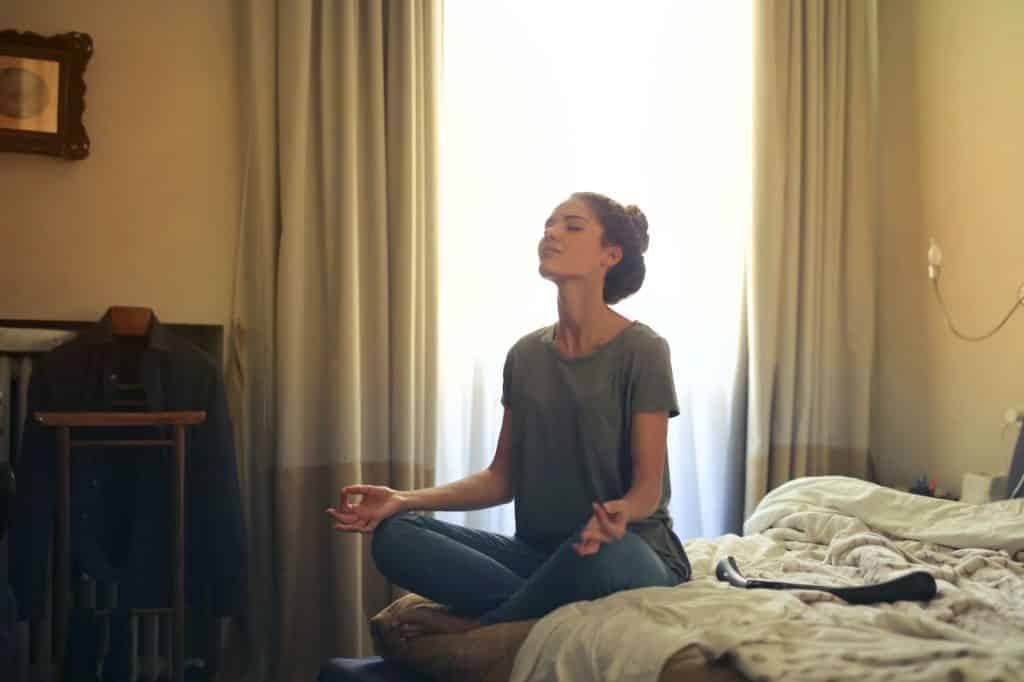Meditation is an ancient practice that works as a means to achieve awareness, focus, and relaxation. People practice meditation to relax their bodies and mind in order to feel lighter and calmer.
But can meditation replace sleep? It’s no secret that meditative practice can reduce stress and improve health. But modern studies suggest that meditation can replace sleep as well.
However, there are some factors that you need to keep in mind before you try to replace sleep with meditation.
Can Meditation Replace Sleep?
You should never try to replace sleep entirely with meditation. Sleep is a necessary process and is vital for our health and wellbeing.
However, according to the National Library of Medicine, meditation can decrease your sleep needs. This study was conducted on novice meditators and it was found that meditation improves the response/reaction time much more than 40 minutes of sleep.
The study also shows that experienced meditators, between 24 to 48 years of age, who meditate daily for at least two hours need less sleep than people who don’t meditate. In addition, they experience alert, calm, and refreshed feelings right after their meditation sessions.
How does meditation help reduce sleep need?
Similar Brain Activity During Meditation and Sleep
As compared to the waking state, your breathing becomes much deeper and slower while sleeping. Whereas, your body needs less oxygen and your mind becomes quiet while meditating, which also decreases the rate of breathing.
Some studies show that the brain activity during light sleep, also called non-REM sleep, is similar to the brain’s state that you have while meditating. However, the effects of meditation and light sleep are different. After meditation sessions, your brain feels active and alert, just like after deep sleep.
However, it certainly doesn’t mean that you can count meditation as sleep. No amount of meditation can replace your need to sleep completely. It can work as a tool but not as an alternative. Keep in mind that meditation reduces your stress whereas the main purpose of restful sleep is to help your body heal and recover.
In addition, you’ll need to perform deep meditation at least two hours a day to see a small difference in your sleep needs. So, meditation can replace your sleep partially but not completely. You’ll still need to go to bed to have a good night’s sleep for several hours to get all the benefits of meditation and sleep.
Read also: Is rest the same as sleep?
How Much Sleep Can You Replace Through How Much Meditation?
According to the OSUCB (Oregon State University’s College of Business) study, you can replace 44 minutes of sleep with 10 minutes of proper meditation. It’s important to note that this study was conducted on overworked entrepreneurs who were suffering from sleep deprivation.
Another study, published in the National Library of Medicine, found that yogis with less than seven hours of daily sleep can replace one to three hours of their sleep through meditation. However, the study doesn’t provide any scientific reason why and how they could achieve it.
Regardless of the reason, you should not attempt it because sleep deprivation can lead to several health problems. You should also keep in mind that yogis are experienced meditators and they spend decades training their bodies to follow a yogic lifestyle. So, instead of trying to replace your sleep, you should use meditation techniques to improve your sleep quality.
Brain State During Meditation and Sleep
It’s important to understand what happens in your brain while sleeping and meditating. It’ll allow you to understand the connection between sleep and meditation.
Brain Activity During Meditation
Meditation allows you to find a state of self-awareness and deep relaxation. There are different types of meditation techniques that you can practice. Depending on the meditation practices you’re following, you might feel sleepy, relaxed, energized, or calm after a session.

During deep meditation, your body releases a feel-good hormone, called endorphin. It allows your body to fight against stress and tiredness. Your body also releases several other hormones such as dopamine, serotonin, and melatonin while meditating that make you feel lighter and calmer.
While meditating, you also need less oxygen than normal as your mind and body are at rest. This is why expert meditators usually have lower heart and oxygen intake during their meditation session.
As far as consciousness is concerned, you have more awareness of your conscious mind (active thought process) and subconscious mind (deep thinking). Your focus improves and you can easily tap into your higher intelligence and creativity in this state.
Brain Activity During Sleep
The sleep duration of an average person is seven to nine hours. Your body goes through four different sleep stages multiple times while you’re sleeping. Each sleep stage can last from 70 to 120 minutes. The following are the four sleep stages that every person experiences during sleep.
Light Sleep Phase
Light sleep is the first part of non-REM sleep where your body prepares itself to enter deep sleep. The duration of this stage is just five to 10 minutes.
Non-REM Phase
In this phase your breathing slows down, your whole body starts to relax, and your body temperature decreases. This stage lasts from 10 to 60 minutes.
Deep Sleep Phase
Deep sleep is the last stage of non-REM sleep and it allows your body to enter complete stillness. The main functions your body performs during this phase include replenishing energy, repairing damaged cells, and rest. It lasts for 20 to 40 minutes.
REM Phase
REM (Rapid Eye Movement) is the last stage of sleep. In this phase, you move your eyes rapidly behind the closed eyelids. Additionally, your breathing becomes irregular, and your heart rate increases. The majority of dreams that you remember take place during this stage and it lasts for 10 to 60 minutes.
Your body can’t perform these functions while you’re meditating. That’s why sleep is critically important for your body. It allows you to feel energized and rested to stay productive during the day. But it certainly doesn’t mean that meditation doesn’t help you in any way.
It allows you to understand your feelings and behaviors better and lead a balanced and healthy life. It’s also possible to remove several sleep problems such as chronic insomnia through a regular meditation practice.
Why Do People Fall Asleep During Meditation Sessions?
Novice meditators commonly fall asleep during their meditative practice. It happens because of the similar brain activity during light sleep and meditation, as mentioned earlier. It shows a strong connection between the two activities.
Another reason why it happens is that it can be challenging to balance awareness, relaxation, and focus simultaneously. You need to practice regularly with patience to resolve this dozing-off problem.
You can also fall asleep while meditating if you start your session after eating a big meal. That’s because your body will need to spend more energy to digest food. So, consider meditating before eating.
You should also drink water before starting your meditation session. It’ll improve your energy levels and allow you to fight against drowsiness.
Should You Try to Replace Sleep with Meditation?
No, you shouldn’t try to replace sleep with meditation. You can focus on your meditation skills and increase your daily meditating time. It might help you sleep less naturally but you shouldn’t decrease your daily sleep duration forcefully.
Not getting enough sleep can make you sleep deprived and it will lead to several health problems including diabetes, high blood pressure, disturbed immune system, depression, obesity, and heart attack.

According to the National Sleep Foundation guidelines, adults, 18 to 64 years of age, should get seven to nine hours of sleep per 24 hours. Whereas adults older than 64 years should sleep eight hours a day.
If you usually take power naps to refuel your attention and energy, you can replace them with meditation. It’ll improve your reaction time far better than power naps and will allow you to work with improved focus.
FAQs
How Much Can Meditation Replace Sleep?
According to the Oregon State University’s College of Business study, meditating for 10 minutes can replace 44 minutes of sleep. This study was conducted on sleep-deprived entrepreneurs so the results can vary from person to person depending on the lifestyle.
Can Meditation Help with Lack of Sleep?
Research shows that different types of meditation can help with lack of sleep and insomnia. It can also improve the sleep quality of those people who aren’t suffering from any sleep issues. Mindfulness meditation is the most effective type of meditation that helps people with chronic insomnia.
Final Words
Sleep is essential for your body and you cannot replace it completely with anything including meditation. It allows your body to recover and rest so that you can feel refreshed and alert after waking up.
On the other hand, meditation isn’t essential but it also offers a range of benefits such as relaxing your body, improving your reaction time, and clearing your thoughts.
You can use it to replace the power naps you take during the day to rejuvenate yourself. But you should never attempt to replace your daily sleep with meditation.
